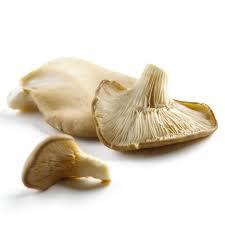 Oyster mushrooms, first cultivated in Germany, were used for their ease of growth and high protein content during WWI. While oyster is the most typical name associated with these mushrooms, they are also known as tree oysters, straw mushrooms, hiratake and tamogitake mushrooms. Oyster mushrooms contain a broad, oyster shaped cap which can grow from two inches in width to over 10 inches. The color can vary from bright white to off-gray, depending on whether or not they are grown in the wild. Oyster mushrooms are known to have a number of poisonous lookalikes, with omphalotus nidiformis, omphalotus olivascens and clitocybe dealbata being a few such poisonous varieties. For this reason, it is best to not search or source oyster mushrooms on your own in the wild. Instead, make sure to buy them from reputable sources and suppliers
Oyster mushrooms, first cultivated in Germany, were used for their ease of growth and high protein content during WWI. While oyster is the most typical name associated with these mushrooms, they are also known as tree oysters, straw mushrooms, hiratake and tamogitake mushrooms. Oyster mushrooms contain a broad, oyster shaped cap which can grow from two inches in width to over 10 inches. The color can vary from bright white to off-gray, depending on whether or not they are grown in the wild. Oyster mushrooms are known to have a number of poisonous lookalikes, with omphalotus nidiformis, omphalotus olivascens and clitocybe dealbata being a few such poisonous varieties. For this reason, it is best to not search or source oyster mushrooms on your own in the wild. Instead, make sure to buy them from reputable sources and suppliers
Key Nutrients
Mushrooms are a great source of protein, copper, potassium, zinc, selenium and B vitamins. Mushrooms are also a great source of dietary fiber and are low in both saturated and unsaturated fat.
Health Benefits
Vitamin B1 – Thiamine is an important vitamin since it breaks down sugars in the body. Thiamine also helps to support nerve and heart health.
Vitamin B6 – Vitamin B6 helps to keep your immune system in good working order. It aids in the breakdown of fats, carbohydrates and amino acids while helping to maintain the health of lymph nodes. Additionally, vitamin B6 helps to regulate blood glucose levels.
Vitamin B9 – Folate is an important vitamin for liver function.
Vitamin B12 – Vitamin B12, or folic acid, helps to preserve neurological function and DNA synthesis. It also plays a key role in the health of red blood cells. The nervous system relies on vitamin B12 for proper function as well.
Dietary Fiber – Dietary Fiber stimulates digestion and peristalsis, helping to relieve indigestion and constipation problems.
Potassium – Potassium is an essential mineral which aids in fluid regulation, protein synthesis and cardiovascular health. High levels of potassium are associated with reduced risk for stroke, improved blood pressure control as well as bone health.
Zinc – The health benefits of Zinc include proper functioning of immune system, digestion, control of blood sugar and energy metabolism.
Copper – Copper is an essential mineral which helps to promote proper growth, enzymatic reactions, healthy connective tissues and proper heart rhythm.
Season
Oyster mushrooms are available year round, but they mature in the wild from late September through October.
Nutrition Information
Per 1 cup (86 grams):
Calories (cKal): 28
Protein (grams): 2.85
Total Fat (grams): .35
Carbohydrates (grams): 5.24
Fiber (grams): 2
Buying and Storing
When buying mushrooms, make sure the flesh is firm to the touch and is free of rot, pests and damage. Store in your refrigerator for up to one week, making sure to place in a sealed bag when possible.
Best Way to Add to Diet
Mushrooms are best enjoyed when cooked. Add cooked mushrooms to your favorite omelet or place on top of grilled fish, burger or steak. Add some freshly cooked mushrooms to any main course dish, or try as a fantastic addition to a soup, stew or stir fry.
Oyster Mushrooms Recipe
Oyster Mushroom and Quinoa Salad

 Not Sure What Healthy Foods To Eat?
Not Sure What Healthy Foods To Eat? This week we take a look at one of my favorite healthy foods...the mighty Avocado.
This week we take a look at one of my favorite healthy foods...the mighty Avocado.
No comments yet.